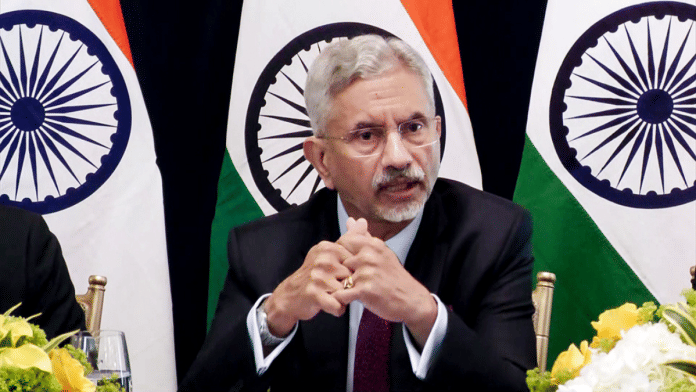New Delhi: External Affairs Minister S. Jaishankar is likely to visit China from 13-16 July for the Shanghai Cooperation Organisation (SCO) foreign ministers’ meeting and a bilateral with his Chinese counterpart Wang Yi, ThePrint has learnt.
A person familiar with the matter indicated the likely visit would include a day in Beijing, where Jaishankar will hold a bilateral meeting with Wang, before heading to Tianjin 15 July for SCO foreign ministers’ meeting.
Jaishankar likely attending the SCO meeting would be the first time since the Pahalgam terrorist attack that Indian and Pakistani foreign ministers would be in the same room. Also, it will be the first visit to China by the Indian external affairs minister since the clashes at Galwan in the summer of 2020.
The visit by EAM Jaishankar follows National Security Advisor Ajit Doval and Defence Minister Rajnath Singh’s travels to China last month for meetings under the different mechanisms of the SCO.
With the meetings coming in the aftermath of the Pahalgam terrorist attack in Jammu and Kashmir, Beijing has had a challenging time as the chair of the organisation, which includes both India and Pakistan as members. The defence ministers’ meeting did not see consensus for a joint statement. India had objected to skipping the mention of the Pahalgam terrorist attack, which left 26 people dead on 22 April.
“I understand that they (defence ministers) could not adopt a joint statement. I also understand that member countries could not reach a consensus on certain issues and hence the document could not be finalised. On our side, India wanted concerns on terrorism reflected in the document, which was not acceptable to one particular country, and therefore the statement was not adopted,” External Affairs Ministry spokesperson Randhir Jaiswal told a regular press briefing last week.
Islamabad had pushed for the inclusion of the Jafar Express attacks in the joint statement, which led to Defence Minister Singh calling for no double standards on terrorism during his address at the meeting.
Doval had briefed his counterparts on Operation Sindoor, India’s response to the Pahalgam terrorist attack and urged the forum to shun double standards on terrorism. He urged the members to hold accountable the perpetrators of terrorism, as reported by ThePrint.
India and China have taken steps to reduce tensions, starting with an agreement last October to disengage at friction points on the Line of Actual Control (LAC). The agreement set the stage for a bilateral between Prime Minister Narendra Modi and Chinese President Xi Jinping on the margins of the BRICS Summit in the Russian city of Kazan in October 2024.
Subsequently, various bilateral mechanisms have been activated, with Jaishankar meeting Wang on the margins of different multilateral forums, Doval travelling to China twice, and Foreign Secretary Vikram Misri holding consultations in Beijing earlier this year.
As part of confidence building measures, China resumed the Kailash Mansarovar Yatra, with the first batch of pilgrims reaching the site at the end of June. India and China are in the process of ironing out the technical details to allow for the resumption of direct flights that have been suspended since the COVID-19 pandemic.
The SCO is a regional grouping, with 10 members, including China, Russia, Uzbekistan, Kyrgyzstan, Tajikistan, Kazakhstan, India, Pakistan, Iran and Belarus. There are two standing bodies – the Secretariat located in Beijing and the Executive Committee of the Regional Anti-Terrorist Structure (RATS) headquartered in Tashkent.
Both India and Pakistan were made members of the inter-governmental organisation in 2017. India chaired the leaders’ summit of the SCO virtually in July 2023. The Council of Heads of States (leaders’ summit) will be held in the Chinese city of Tianjin this year. The meeting is expected to be held in September 2025.
(Edited by Ajeet Tiwari)
Also Read: Need permanent solution to border issue, Rajnath Singh tells China on sidelines of SCO meet






